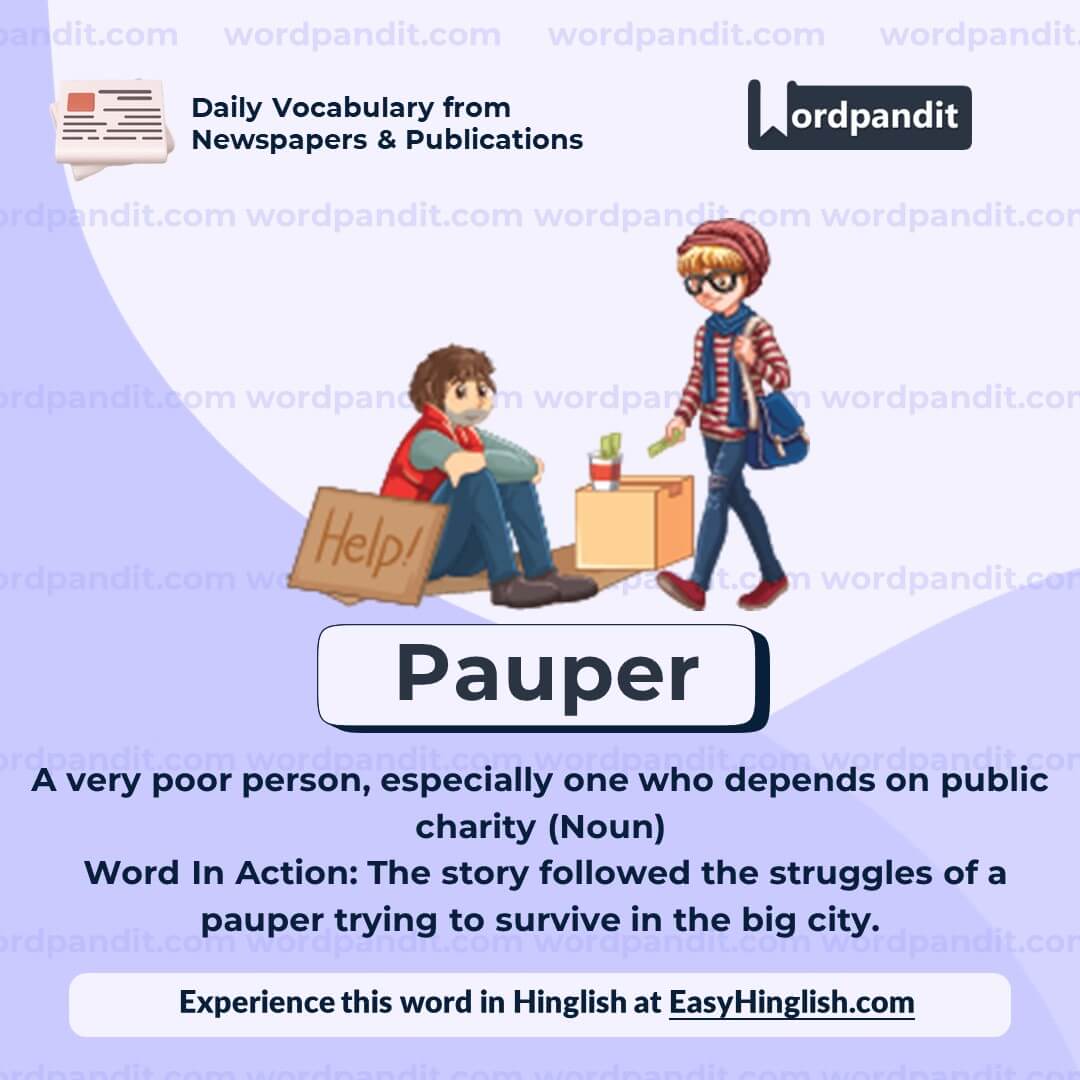Daily Vocabulary from Indian Newspapers and Publications
Welcome to Wordpandit’s Indian Vocabulary Hub
At Wordpandit, we understand the importance of staying rooted in the local context while expanding your language skills. This section focuses on enriching your vocabulary with words and phrases drawn from India’s leading newspapers and publications, ensuring you're learning vocabulary that is practical, relevant, and uniquely Indian.
Why Indian Sources Matter
We believe that the best way to master any language is by immersing yourself in local content. That’s why we carefully curate vocabulary from top Indian publications, including:
- The Hindu
- The Times of India
- The Economic Times
- Hindustan Times
- Live Mint
- The Indian Express
- And many others...
Stay Updated, Stay Relevant
With daily updates from Indian news sources, you’ll be consistently learning words that reflect the trends and shifts in Indian society and culture. Our focus is to provide vocabulary that enhances your understanding of the language in an Indian context.
How Wordpandit Supports Your Goals
Whether you’re preparing for exams, aiming to improve your professional communication, or simply want to stay connected with the latest Indian vocabulary, Wordpandit is here to guide you every step of the way.
Learn with a Practical Approach
Our interactive learning methodology includes real-world examples, engaging activities, and context-specific usage to ensure that every word becomes part of your active vocabulary.
Dive into Indian Vocabulary Today!
Why Choose Wordpandit?
Practical Learning: Focus on words you'll actually encounter in real-world reading, enhancing your comprehension and communication skills.
Diverse Content: From current affairs to scientific breakthroughs, our varied sources expose you to vocabulary across multiple domains.
Effortless Integration: Make Wordpandit a part of your daily routine. Just a few minutes each day can significantly boost your lexicon over time.
Your Path to Vocabulary Mastery
- Visit our Daily Vocabulary section regularly
- Explore new words and their usage in context
- Practice incorporating these words into your own writing and speech
- Track your progress as your vocabulary expands
Start Your Journey Today
Embark on your vocabulary enhancement journey with Wordpandit. By consistently engaging with our daily posts, you'll build a robust vocabulary that serves you well in academic, professional, and personal contexts.
Remember, a word a day keeps linguistic limitations at bay. Make Wordpandit your daily companion in the quest for vocabulary excellence!
WORD-1: Frivolous
Context:
"Part of the brain rot phenomenon arises when people create and exchange phrases and words that are frivolous, transient, ironic or just nonsensical." - The Wire
Explanatory Paragraph:
The word "frivolous" is used to describe actions, behaviors, or ideas that lack seriousness, importance, or purpose. It often implies a sense of being unnecessarily light-hearted or trivial, especially in situations where seriousness might be expected.
Meaning: Lacking seriousness or importance; trivial (adjective)
Pronunciation: frih-vuh-luhs
Difficulty Level: ⭐⭐⭐ Intermediate
Etymology: Derived from Latin "frivolus," meaning "silly, trifling," and later adopted into Middle English.
Synonyms & Antonyms:
Synonyms: trivial, superficial, petty, insignificant
Antonyms: serious, significant, meaningful, weighty
Usage Examples:
- Her frivolous spending habits left her struggling to pay bills at the end of the month.
- The judge dismissed the frivolous lawsuit due to its lack of merit.
- During the meeting, his frivolous comments distracted from the main agenda.
- It's important to avoid frivolous decisions when planning your career.
Cultural Reference:
"Frivolous lawsuits" are often highlighted in legal dramas and discussions, symbolizing the misuse of judicial systems for trivial or non-serious claims. This critique has been popularized in media and literature to question societal priorities. - Various Sources
Think About It:
Why do people often prioritize frivolous activities over meaningful ones, especially when time is limited?
Quick Activity:
Write down three examples of situations in your life where you feel you acted frivolously. Reflect on how you might have approached them differently.
Memory Tip:
Remember "frivolous" by associating it with "frills"—unnecessary decorations or extras that are not serious or important.
Real-World Application:
"Frivolous" is commonly used in legal and financial contexts to criticize actions or expenditures lacking seriousness. For instance, a "frivolous lawsuit" refers to one without substantial grounds.
WORD-2: Transient
Context:
"Part of the brain rot phenomenon arises when people create and exchange phrases and words that are frivolous, transient, ironic or just nonsensical." - The Wire
Explanatory Paragraph:
The word "transient" refers to something that is temporary, fleeting, or short-lived. It can describe anything that exists or operates for a brief period of time, such as emotions, events, or even people who do not stay in one place for long.
Meaning: Lasting only for a short time; impermanent (adjective)
Pronunciation: tran-zee-uhnt
Difficulty Level: ⭐⭐⭐ Intermediate
Etymology: From Latin "transire," meaning "to go across" or "pass by," and adopted into English in the late 16th century.
Synonyms & Antonyms:
Synonyms: temporary, fleeting, ephemeral, momentary
Antonyms: permanent, lasting, enduring, perpetual
Usage Examples:
- The transient nature of fame often leaves celebrities feeling empty once the spotlight fades.
- The transient population of the town increased during the tourist season.
- Happiness can be transient, so it's important to cherish each joyful moment.
- They found shelter in a transient housing program while searching for permanent accommodation.
Cultural Reference:
In literature, transient beauty or fleeting moments often symbolize the impermanence of life. This theme is central to many works, including the poetry of the Romantic era, which reflects on the transient nature of existence. - Various Sources
Think About It:
How can recognizing the transient nature of experiences help us live more fully in the present?
Quick Activity:
List three transient experiences from your life that had a lasting impact on your perspective. Reflect on why their impermanence made them significant.
Memory Tip:
Think of "transient" as "transit"—something or someone in transit is not staying in one place for long.
Real-World Application:
"Transient" is often used in discussions about populations, weather, or emotions. For example, transient workers refer to individuals who move frequently for short-term jobs, and transient weather conditions describe brief changes in climate.
WORD-3: Pauper
Context:
"As a year that saw the Adanis and Ambanis capture disproportionate media space by employing the ancient Roman principle, panem et circenses, or bread and circuses, to enthrall the paparazzi and pauper alike." - The Wire
Explanatory Paragraph:
The word "pauper" refers to a person who is extremely poor and lacks the basic means of support. In this context, it highlights the wide reach of media influence, emphasizing that both the affluent and the impoverished are captivated by the same spectacles.
Meaning: A very poor person, especially one who depends on public charity (Noun)
Pronunciation: PAW-per
Difficulty Level: ⭐⭐ Beginner
Etymology: Derived from Latin "pauper," meaning "poor" or "needy."
Synonyms & Antonyms:
Synonyms: Destitute, beggar, mendicant
Antonyms: Affluent, wealthy, aristocrat
Usage Examples:
- The kind-hearted millionaire donated a significant amount to the pauper who had been living on the streets.
- The play vividly depicted the life of a pauper struggling to make ends meet in a bustling city.
- In medieval times, a pauper’s only hope was often the charity of monasteries.
- Despite his pauper status, he carried himself with remarkable dignity and grace.
Cultural Reference:
"The Prince and the Pauper" by Mark Twain is a classic tale that juxtaposes the lives of a poor boy and a royal, exploring themes of identity and social class.
Think About It:
What societal systems perpetuate the existence of paupers, and how can they be addressed in the modern world?
Quick Activity:
Write a short story or scenario in which a pauper makes a surprising contribution to their community.
Memory Tip:
Think of "pauper" as "poor person," since both words start with "p" and describe financial hardship.
Real-World Application:
The word "pauper" is frequently used in discussions about poverty, charity, and social welfare systems, making it relevant in literature, history, and socioeconomic studies.
WORD-4: Deliberately
Context:
"This describes new words, messages or performances deliberately generated by online influencers to draw attention to themselves and gain followers and fame." - The Wire
Explanatory Paragraph:
The word "deliberately" refers to actions that are performed intentionally, with full awareness and purpose. It indicates a conscious effort to achieve a specific goal or result, often implying thoughtfulness or careful planning.
Meaning: Done consciously and intentionally (adverb)
Pronunciation: dih-lib-er-it-lee
Difficulty Level: ⭐⭐ Beginner
Etymology: From the Latin "deliberatus," past participle of "deliberare," meaning "to consider," and later adopted into Middle English.
Synonyms & Antonyms:
Synonyms: intentionally, purposely, knowingly, consciously
Antonyms: accidentally, unintentionally, impulsively, carelessly
Usage Examples:
- She deliberately left the door open so her cat could come inside.
- The author deliberately included a twist ending to surprise the readers.
- He spoke deliberately, choosing his words with care to avoid misunderstanding.
- The mistake was not accidental; it was done deliberately to expose the flaws in the system.
Cultural Reference:
In filmmaking, directors often use lighting and camera angles deliberately to evoke specific emotions or guide the audience's attention. For example, Alfred Hitchcock’s use of deliberate close-ups creates suspense. - Various Sources
Think About It:
How can being deliberate in our actions influence our success and the way others perceive us?
Quick Activity:
Write a short paragraph about a recent decision you made deliberately. What was the outcome, and how did it differ from an impulsive decision?
Memory Tip:
Associate "deliberately" with "deliberation"—imagine a judge deliberating carefully to ensure a fair verdict, emphasizing thoughtfulness and intention.
Real-World Application:
"Deliberately" is commonly used to highlight conscious decision-making in various fields, such as law, strategy, and daily life. For example, companies often advertise deliberately to target specific demographics and achieve better results.
WORD-5: Emanate
Context:
"Dazed magazine, whose millennial and gen Z staff largely inhabit the world from which those terms emanate, are unhappy with the publishers’ final choices." - The Wire
Explanatory Paragraph:
The word "emanate" refers to something that originates or spreads out from a source. It suggests a process where an intangible element, such as an idea, emotion, or quality, flows outward, often in a noticeable or significant way.
Meaning: To come out from a source; to originate (verb)
Pronunciation: em-uh-nate
Difficulty Level: ⭐⭐⭐ Intermediate
Etymology: From the Latin "emanare," meaning "to flow out," and later adopted into Middle English.
Synonyms & Antonyms:
Synonyms: originate, radiate, emit, exude
Antonyms: absorb, terminate, extinguish, suppress
Usage Examples:
- The scent of jasmine seemed to emanate from the garden, filling the air with its sweetness.
- Her confidence and authority emanated from years of experience in the field.
- The light emanating from the lamp provided a soft glow in the dark room.
- The rumors emanate from a single unreliable source, making them questionable.
Cultural Reference:
In science fiction, the concept of energy emanating from a powerful source, like a star or an alien artifact, is a common trope. This idea is seen in works like "Star Trek" and other speculative genres. - Various Sources
Think About It:
What qualities or emotions do you think people perceive as emanating from you? How do those perceptions align with your intentions?
Quick Activity:
List three things that emanate from your favorite person (e.g., kindness, humor). Consider how those qualities impact others around them.
Memory Tip:
Link "emanate" to "emit"—imagine light or energy flowing outward from a central source, much like rays from the sun.
Real-World Application:
"Emanate" is commonly used in discussions about abstract origins, such as where ideas, emotions, or qualities begin. For example, a leader's charisma may emanate from their ability to inspire trust and confidence in their team.


















